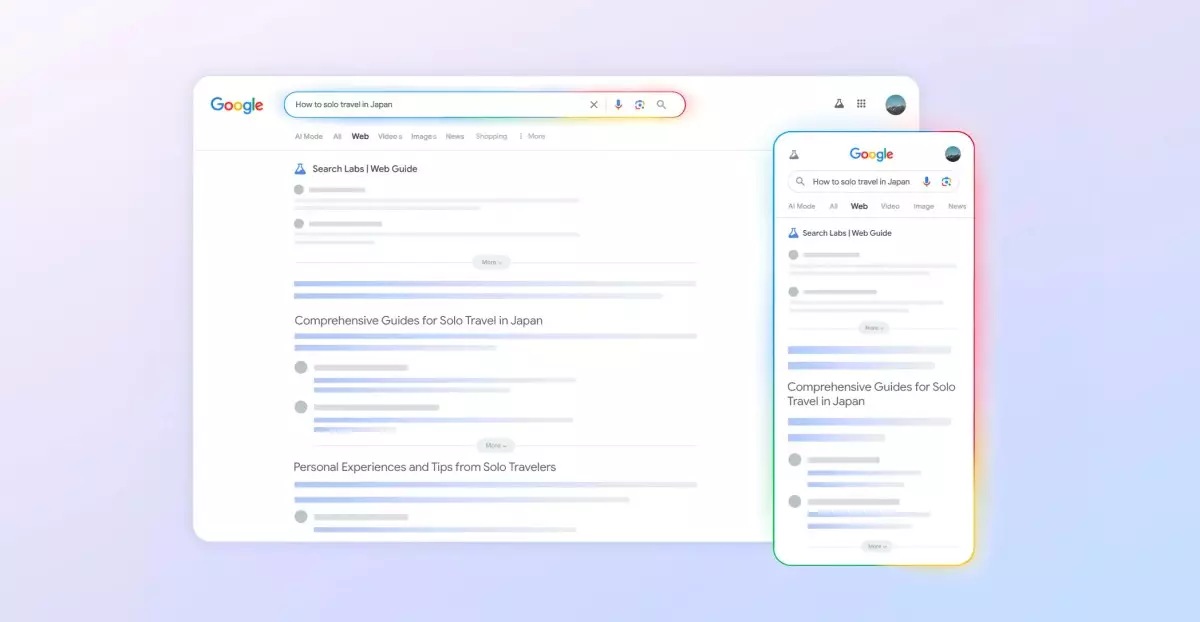The emergence of Google’s Web Guide represents a significant shift in how we access information online. By leveraging advanced AI—specifically a customized version of Google’s Gemini model—this feature aims to move beyond the classic “10 blue links” paradigm that has dominated search engines for decades. Instead of merely presenting a list of links, Web Guide endeavors to categorize, curate, and clarify results, making the often overwhelming sea of information more navigable. This evolution is both promising and fraught with its own set of challenges; it signifies a transition from human-driven, manual curation to AI-assisted, dynamic organization of search data.
While the concept sounds revolutionary, it raises critical questions about the effectiveness of AI in understanding nuance and context. AI’s ability to deliver relevant, categorized snippets hinges on its training data and algorithmic precision. In practice, the system’s reliance on generative AI to identify related questions and group links might streamline the search experience, but it also risks oversimplifying complex topics. For example, when searching for “how to care for a mango tree,” the results are neatly categorized into relevant themes like climate-specific care or troubleshooting issues. This style of presentation could be a boon for casual users seeking quick answers; however, it may also suppress deeper research that requires nuanced reading of multiple sources, particularly if categories are too broad or generic.
Strengths: Bringing Order to Web Chaos
One undeniable benefit of Web Guide is its potential to restore some sanity in the chaos of modern search results. Traditional search results often favor clickbait, SEO manipulation, or outdated content, forcing users to sift through numerous links to find credible information. Web Guide’s categorization provides a clearer roadmap—highlighting authoritative sources such as university extensions, and mixing it with multimedia content like YouTube tutorials or Reddit threads. This arrangement offers a more balanced view, presenting facts alongside community discussions, which can be particularly beneficial for practical, hands-on topics like gardening or tech troubleshooting.
Furthermore, the underlying engine’s ability to handle multi-layered queries via “query fanout” suggests a smarter, more adaptive approach to search. The AI’s capacity to parse complex questions—say, about maintaining long-distance relationships—and generate comprehensive, multipart responses exemplifies a move toward more conversational and humanized search experiences. This could revolutionize how we depend on Google for not just quick facts but for advice, insights, and layered understanding.
Critique and Concerns: When AI Overreach Creates Clutter
Despite its strengths, Web Guide showcases the inherent limitations of AI-driven search. The accompanying descriptions beneath categories—such as the boilerplate “The most effective way to care for a mango tree varies slightly depending on its age, location, and specific cultivar”—highlight how AI’s summaries can often be superficial or overly generic. These kinds of remarks, while seemingly helpful, can also be redundant or even distracting when the user is seeking precise, detailed information. They risk turning what should be a fluid browsing experience into a checklist of superficial qualifiers.
Another vital issue is the potential for bias and misinformation. With Google’s high-profile deals with platforms like Reddit—where content quality varies widely—there is a real risk that the AI could prioritize less trustworthy sources or inadvertently repeat popular misconceptions. The reliance on user-generated content for AI training and curation raises questions about accountability. If the AI’s categorizations and summaries are flawed, users might be misled or discouraged from exploring the depth of a subject.
Moreover, the shift to AI-organized results could inadvertently diminish the value of traditional search skills. As algorithms take a more dominant role in shaping what we see, there’s a danger that users become passive consumers of AI summaries rather than active participants clicking through diverse sources for verification. The move toward embedding AI results directly into the “Web” tab hints at a future where conventional links may become secondary or even obsolete, prompting concerns about transparency and user agency.
The Road Ahead: Balancing Innovation with Skepticism
Google’s Web Guide embodies both the promise and the peril of AI-powered search. It offers clear improvements—more organized results, multi-category insights, and the potential to save time. Yet, its reliance on generative AI, combined with the inherent flaws of machine learning, necessitates a cautious approach. Users must remain vigilant, questioning whether these summaries and categories accurately reflect the vast, complex landscape of human knowledge.
In my opinion, the true challenge for Google—and similar tech giants—is not merely deploying sophisticated AI but ensuring it serves as a trustworthy, transparent partner in knowledge discovery. The promise of Web Guide is compelling, but its success hinges on continuous refinement, unbiased training data, and a commitment to fostering user literacy. Until then, it remains an exciting, yet imperfect, step toward a future where search engines are not just passive indexers but active guides through the digital maze.

